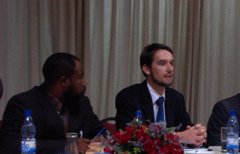The African Nuclear Weapon-Free Zone Treaty, or Pelindaba Treaty, is Africa’s answer to the threat of nuclear proliferation and energy-source diversification. The PNND’s Kaspar Beech visited five African capitals to reinvigorate the stalled ratification process. The first results of the mission are now coming to bear and it is looking positive.
 |
|
PNND Assistant Global Coordinator Kaspar Beech before the Malawi Foreign Affairs Committee |
|
| |
|
The Pelindaba Treaty opened for signature in 1996 and has been signed by 51 of the 53 African States. However, to date only 24 of these 28 states required for entry-into-force have ratified. The entry-into-force of the treaty will trigger the establishment of the African Commission on Nuclear Energy (AFCONE) whose job it will be to encourage the cooperative exploitation of peaceful nuclear technology and, in concert with the International Atomic Energy Association (IAEA) police the proliferation threats posed by the nuclear fuel and energy revolution currently taking place in Africa. The treaty’s ratification will also form the last of the southern hemisphere’s five nuclear weapons-free zones (Africa, Pacific, South-East Asia, Antarctica and Latin America and the Caribbean) and facilitate the potential establishment of a Southern Hemisphere and Adjacent Areas Nuclear Weapons-free Zone.
For many states though, the immediacy of development issues rise over and above those of nuclear proliferation and disarmament. The successful prohibition on nuclear testing and the curtailment of nuclear weapons programmes in South Africa and Libya has removed the issue of nuclear weapons from the agenda of most policy makers. This is despite the emergence of other nuclear threats in Africa. Power shortages have fuelled interest in the development of nuclear energy and a massive increase in exploration and extraction of uranium is now viable due to increased uranium prices. This brings with it proliferation risks and possible terrorist targeting of nuclear facilities. The Pelindaba Treaty deals with these, and many other, threats to Africa but is impotent without the requisite 28 ratifications for its entry-into-force.
To encourage a solution to this need, Parliamentarians for Nuclear Non-proliferation and Disarmament (PNND), a subsidiary of the Global Security Institute (GSI) sent a representative, Kaspar Beech, to Africa to raise the issue with policy and decision makers in five African capitals. Basing himself in Zimbabwe with PNND Global Council Member and opposition Movement for Democratic Change (MDC) Senator, David Coltart, Mr. Beech visited Burundi, Malawi, Mozambique, Namibia, and Zambia. While the reception in all countries was warm and welcoming, nobody knew of the treaty or that their country had signed it. As a result Mr. Beech’s role was primarily to provide information on the treaty and its implications for the non-proliferation regime, how it could help African development, and why it should be a key part of that country’s security, cooperation and trade lexicon. The results were overwhelmingly positive. Mr. Beech did not visit Angola but struck up conversation with senior MPs and met representatives of the government while in Namibia. This prompted the committee on Foreign Affairs to request a report on Angola’s ratification of the foreign ministry. The Burundian government immediately set its legal teams onto the documentation and asked them to draft a report for the Minister of External Relations and Cabinet. In Malawi the President’s Chief of Staff promised to give “priority consideration to our ratification of the Treaty”, and so did the Minister of Mines and Energy, and numerous diplomats and parliamentarians. Mozambique ratified the treaty in late March becoming the 24th country to do so. In Namibia parliamentarians and civil service officials were briefed on the treaty and one opposition MP promised to question the government in the House. In Zambia the Foreign Minister personally promised to ratify the treaty before the end of 2008.
| |
|
| |
UNITA spokesman and Angolan ambassador
with Mr. Beech in Namibia |
The efforts of the PNND were discussed at both the GSI’s Article VI Forum and at the UN’s NPT PrepCom in Geneva. As a result an informal working group was established to pool the resources of differing parties and to coordinate initiatives. This is representative of a broad base of energy now being focused on the Pelindaba Treaty.
For a country-by-country report please continue below.
- In Burundi Mr. Beech met with senior members of the government, civil service and parliament including the Minister of Justice and Attorney General, Archbishop of Burundi, Secretary General of Government, Principle Secretaries of the Ministries of External Relations and Mines, Deputy Speaker of the Senate and Vice-chair of the House foreign Affairs Committee. Burundi had previously considered ratifying the treaty but the decision was not made because of government collapse. Despite this, there was real warmth towards the idea and the process for ratification was begun with the relevant documentation regarding the Pelindaba Treaty being examined and a report and briefings authored for the Minister of External Relations.
- In Malawi the Principle Secretary of the President and Cabinet promised to give “priority consideration to our ratification of the Treaty”. I had been attempting to meet with him for the full weak that I was there but was unable. I did meet with senior figures including the former Vice-President, the speaker of the house, the Minister of Mines and Energy, the Principle Secretaries of the Ministries of Mines and Energy, Justice and Solicitor General, representatives of the Ministry of Foreign Affairs and the director of the department for environmental affairs. In addition to this I testified to the Foreign Affairs select committee and met members of the Committees for Defence, Environment and Foreign Affairs. While I was in Malawi so were representatives of the IAEA who were advising Malawi on what policies and safeguards would be required for the passing of a law governing the export of their Yellow Cake uranium. Mr. Beech made sure that ratification of the Pelindaba Treaty would be a part of this process. Support of these ideas demonstrated by the five parliamentarians who joined the PNND.
- Mozambique yielded the warmest response of all the States visited. Mr. Beech met with the opposition Foreign Minster, the deputy chair of the Foreign Relations committee, a member of the Justice Committee and the head of treaty and legal affairs department at the Ministry of External Relations and Cooperation. As a result the opposition Foreign Minister gathered a group of MPs together and requested of the Foreign Minister that she present the Treaty to the House for a vote. She did so and on March 26th 2008 the Mozambican parliament voted to ratify the Treaty. Mozambique became the 24th country to ratify the treaty.
- Namibia was the most difficult country in which to make progress. Despite spending over two weeks in the country Mr. Beech found it very difficult to get high level meetings and those that he did get were with representatives both disinterested and uninformed. On the flip side, the civil society representatives Mr. Beech met were very welcoming and enthusiastic. However, the meetings with government, especially that with the clerk of parliament, were abrasive, rude and dismissive. Mr. Beech had meetings with the Ministries of Foreign Affairs, Justice, Mines and Energy and with the office of the Speaker of Parliament and attorney General and no one could accurately place the official custodian of the Treaty. The result was a pledge by the official opposition Foreign Affairs Minister to raise questions regarding ratification in Parliament.
- While in Namibia Mr. Beech met with representatives of the Government of Angola. He had also been in conversation with a senior MP in that country and was very encouraged to see that MP request the speaker of the House to consider the matter. Resultantly the Committee on Foreign Affairs requested a report of the legal implications from the Foreign Ministry which will report back to the committee and the speaker.
- In Zambia Mr. Beech was introduced to the Foreign Minister by a senior MP. The Minster promised to ratify the Treaty before the end of 2008. Mr. Beech also met with the Attorney General, the Director of the department for International Organisations and the head of Zambia’s Campaign against Land Mines. On all counts the response was positive: Zambia has in its interests the ratification of the Pelindaba Treaty and will do so in 2008.
Read more about the Pelindaba Treaty, the treaty that aims to make Africa a Nuclear Weapons-Free Zone, and other NWFZs around the world.
The Center for Nonproliferation Studies has excellent resources on the Pelindaba Treaty, including a Ratification Pack of information on what most African states must do to ratify.
Read the report from PNND Member Raphael Chegeni and PNND Assistant Global Coordinator Kaspar Beech on completing the Pelindaba Treaty. |
 |


